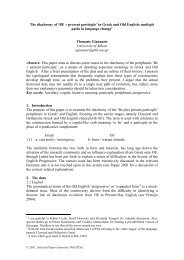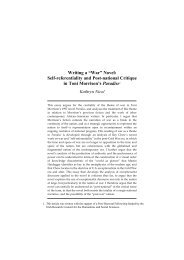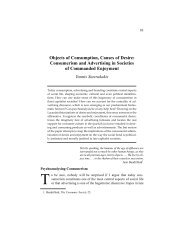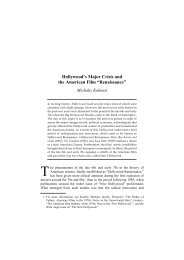19 International Symposium on Theoretical and Applied Linguistics ...
19 International Symposium on Theoretical and Applied Linguistics ...
19 International Symposium on Theoretical and Applied Linguistics ...
You also want an ePaper? Increase the reach of your titles
YUMPU automatically turns print PDFs into web optimized ePapers that Google loves.
G E N E R A L S E S S I O N<br />
[sp], [st], [sk]), I decided to investigate the interdependence of s<strong>on</strong>ority <strong>and</strong> cluster reducti<strong>on</strong> <strong>on</strong> the<br />
basis of data from children who acquire L1 allowing falling s<strong>on</strong>ority.<br />
Although, the participants of the study show certain similarities in ph<strong>on</strong>ological development e.g.<br />
the tendency to retain the stop in /sC/ clusters (which seems to be in agreement with the findings in<br />
similar studies of St<strong>and</strong>ard Greek - speaking children (Kappa, 2006)) there are still certain differences,<br />
which partially can be explained by the fact that the Cypriot Greek is not as rich as the Russian<br />
language in clusters of falling s<strong>on</strong>ority.<br />
References<br />
Kappa, I. 2006. On the acquisiti<strong>on</strong> of the syllabic structure in Greek. John Benjamins<br />
Pater, J. & Barlow, J. 2003. C<strong>on</strong>straint c<strong>on</strong>flict in cluster reducti<strong>on</strong>. Journal of Child Language. Vol. 30.<br />
Greek state-school teachers’ educati<strong>on</strong>al priorities: a preliminary review<br />
Nicos Sifakis<br />
Hellenic Open University<br />
sifakis@eap.gr<br />
The paper reviews the major priorities in the domain of in-service ESOL teacher educati<strong>on</strong> <strong>and</strong><br />
training in Greece. All participants in the current research are state-school teachers who are currently<br />
beginning their postgraduate studies at the Hellenic Open University. I begin by reviewing current pre-<br />
<strong>and</strong> in-service teacher educati<strong>on</strong> practices in Greece <strong>and</strong> go <strong>on</strong> to report <strong>on</strong> a short-scale study of<br />
these state-school teachers’ percepti<strong>on</strong>s with regard to the ways in which they prioritize their own<br />
training needs. In particular, the paper focuses <strong>on</strong> two broad domains. The first domain regards<br />
teachers’ percepti<strong>on</strong>s about issues that are “traditi<strong>on</strong>ally” c<strong>on</strong>sidered of central c<strong>on</strong>cern, such as those<br />
that are related to teaching methodology, class management, language skills instructi<strong>on</strong>, learner<br />
assessment, etc. The sec<strong>on</strong>d domain focuses <strong>on</strong> teacher’s percepti<strong>on</strong>s about “n<strong>on</strong>-traditi<strong>on</strong>al” issues,<br />
such as global English/English as a Lingua Franca, intercultural competence, the native/n<strong>on</strong>-native<br />
speaker dichotomy, the use of technology in teaching, etc. I provide a critical underst<strong>and</strong>ing of these<br />
issues with reference to a number of parameters, such as years of teaching experience, teacher selfc<strong>on</strong>fidence<br />
<strong>and</strong> professi<strong>on</strong>al <strong>and</strong> social status, <strong>and</strong> c<strong>on</strong>clude by discussing implicati<strong>on</strong>s for<br />
academically-oriented teacher educati<strong>on</strong> programmes.<br />
Ο µη συνοπτικός τύπος και ο επιρρηµατικός προσδιορισµός διάρκειας «για Χ ώρα»<br />
Αθηνά Σιούπη<br />
Αριστοτέλειο Πανεπιστήµιο Θεσσαλονίκης<br />
sioupi@del.auth.gr<br />
Εισαγωγή: Στην Αγγλική οι προτάσεις στον εξελισσόµενο τύπο («progressive») είναι καταστασιακές<br />
είτε χαρακτηρίζονται ως ατελικές (διαδικασίες) είτε ως τελικές (γεγονοτικές), όπως δείχνουν τα<br />
παραδείγµατα (1α, β) από την de Swart (<str<strong>on</strong>g>19</str<strong>on</strong>g>98): (1) α. Sue was writing letters (ατελική, διαδικασία), β.<br />
Sue was writing a letter (τελική, γεγονοτική). Σύµφωνα µε τον Pars<strong>on</strong>s (<str<strong>on</strong>g>19</str<strong>on</strong>g>90:171) “changing an event<br />
verb to the progressive form requires that it be treated as a state verb; the sentence in questi<strong>on</strong> thus<br />
requires for its truth that the event in questi<strong>on</strong> hold, not that it culminate”. Στην ελληνική, στην οποία<br />
υπάρχει διάδραση ανάµεσα σε λεξική (Smith <str<strong>on</strong>g>19</str<strong>on</strong>g>91/1007, Krifka <str<strong>on</strong>g>19</str<strong>on</strong>g>89, 2001/2 µ.ά.) και γραµµατική όψη<br />
(Comrie <str<strong>on</strong>g>19</str<strong>on</strong>g>76, Μόζερ <str<strong>on</strong>g>19</str<strong>on</strong>g>94, Horrocks & Stavrou 2003, 2007 για την Ελληνική µ.ά) «ο εξελισσόµενος<br />
τύπος δεν διαφοροποιείται µορφολογικά από τον µη εξελισσόµενο» (Μόζερ <str<strong>on</strong>g>19</str<strong>on</strong>g>94:44) και αναφέρεται<br />
στη διάκριση συνοπτικός µη-συνοπτικός (συνοπτικός τύπος: έτρεξα, αγάπησα, έτρεξα ένα χιλιόµετρο,<br />
µη-συνοπτικός: έτρεχα, αγαπούσα, έτρεχα ένα χιλιόµετρο).<br />
Στόχος της ανακοίνωσης αυτής είναι να διερευνηθεί αν και στην Ελληνική ο µη συνοπτικός τύπος<br />
µε διαφορετικές ρηµατικές κατηγορίες (επιτεύξεις, τελειώσεις, καταστάσεις, δραστηριότητες) σε<br />
συνδυασµό µε τον επιρρηµατικό προσδιορισµό διάρκειας «για Χ ώρα» προσδίδει καταστασιακή<br />
ανάγνωση. Συγκεκριµένα, θα υποστηρίξω ότι ο µη συνοπτικός τύπος µιας επίτευξης, µιας τελείωσης<br />
και µιας δραστηριότητας όταν εµφανίζεται µε τον επιρρηµατικό προσδιορισµό «για Χ ώρα» αποκτά<br />
θαµιστική ερµηνεία και η πρόταση αναλύεται σηµασιολογικά ως καταστασιακή.<br />
Ανάλυση: Ο επιρρηµατικός προσδιορισµός διάρκειας «για Χ ώρα» είναι µετατροπέας άποψης (type<br />
shifter) και αναφέρεται σε διαδικασίες. H πρόταση (2) η Άννα έσπαγε ένα βάζο για εβδοµάδες<br />
εµπεριέχει ένα ρήµα που ανήκει στην κατηγορία επιτεύξεις στην οποία µπορεί να αποδοθεί και<br />
θαµιστική ερµηνεία. Η σηµασία της πρότασης µε τη θαµιστική ερµηνεία αναπαρίσταται στο (2’), όπου<br />
<str<strong>on</strong>g>19</str<strong>on</strong>g> th ISTAL 51






